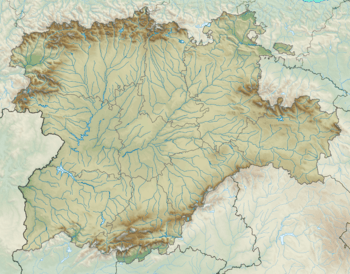Piedrahita de Muñó Formation
The Piedrahita de Muñó Formation is an Early Cretaceous geologic formation of the Cameros Basin in northern Spain.[1] Fossil theropod tracks have been reported from the formation.[2] Also fossils of Lepidotes sp., Polacanthus sp. and Testudines indet. were found in the formation.[1]
| Piedrahita de Muñó Formation Stratigraphic range: Late Berriasian-mid-Valanginian ~140–136 Ma | |
|---|---|
| Type | Geological formation |
| Unit of | Pedroso/Urbión Group |
| Underlies | Hortigüela Formation |
| Overlies | hiatus with Villar del Arzobispo Formation |
| Lithology | |
| Primary | Sandstone |
| Location | |
| Coordinates | 42.0°N 3.2°W |
| Approximate paleocoordinates | 33.1°N 7.7°E |
| Region | Burgos Province, Castile and León |
| Country | |
| Extent | Cameros Basin |
| Type section | |
| Named for | Piedrahita de Muñó |
 Piedrahita de Muñó Formation (Spain)  Piedrahita de Muñó Formation (Castile and León) | |
Correlation
| Ma | Age | Paleomap \ Basins | Cantabrian | Olanyà | Cameros | Maestrazgo | Oliete | Galve | Morella | South Iberian | Pre-betic | Lusitanian | ||
|---|---|---|---|---|---|---|---|---|---|---|---|---|---|---|
| 100 | Cenomanian |  | La Cabana | Sopeira | Utrillas | Mosquerela | Caranguejeira | |||||||
| Altamira | Utrillas | |||||||||||||
| Eguino | ||||||||||||||
| 125 | Albian | Ullaga - Balmaseda | Lluçà | Traiguera | ||||||||||
| Monte Grande | Escucha | Escucha | Jijona | |||||||||||
| Itxina - Miono | ||||||||||||||
| Aptian | Valmaseda - Tellamendi | Ol Gp. - Castrillo | Benassal | Benassal | Olhos | |||||||||
| Font | En Gp. - Leza | Morella/Oliete | Oliete | Villaroya | Morella | Capas Rojas | Almargem | |||||||
| Patrocinio - Ernaga | Senyús | En Gp. - Jubela | Forcall | Villaroya | Upper Bedoulian | Figueira | ||||||||
| Barremian | Vega de Pas | Cabó | Abejar | Xert | Alacón | Xert | Huérguina | Assises | ||||||
| Prada | Artoles | Collado | Moutonianum | Papo Seco | ||||||||||
| Rúbies | Tera Gp. - Golmayo | Alacón/Blesa | Blesa | Camarillas | Mirambel | |||||||||
| 150 | Hauterivian |  | Ur Gp. - Pinilla | Llacova | Castellar | Tera Gp. - Pinilla | Villares | Porto da Calada | ||||||
| hiatus | ||||||||||||||
| Huerva | Gaita | |||||||||||||
| Valanginian | Villaro | Ur Gp. - Larriba | Ped Gp. - Hortigüela | |||||||||||
| Ped Gp. - Hortigüela | Ped Gp. - Piedrahita | |||||||||||||
| Peñacoba | Galve | Miravetes | ||||||||||||
| Berriasian |  | Cab Gp. - Arcera | Valdeprado | hiatus | Alfambra | |||||||||
| TdL Gp. - Rupelo | Arzobispo | hiatus | Tollo | |||||||||||
| On Gp. - Huérteles Sierra Matute | ||||||||||||||
| Tithonian | Lastres | Tera Gp. - Magaña | Higuereles | Tera Gp. - Magaña | Lourinhã | |||||||||
| Arzobispo | ||||||||||||||
| Ágreda | ||||||||||||||
| Legend | Major fossiliferous, oofossiliferous, ichnofossiliferous, coproliferous, minor formation | |||||||||||||
| Sources | ||||||||||||||
gollark: I'm working on Minoteaur 2.0 right now, in my traditional style of "terrible architecture, TypeScript and a million libraries", and it's going surprisingly well.
gollark: As in, excessively layery?
gollark: I am not familiar with all trendy words for describing some types of code.
gollark: Also, have you tried JavaTypeScript?
gollark: What is Python doing wrong?
See also
- List of dinosaur-bearing rock formations
References
- Piedrahita de Muñó Formation at Fossilworks.org
- Weishampel et al., 2004, pp. 517-607
Bibliography
- Weishampel, David B.; Peter Dodson, and Halszka Osmólska (eds.). 2004. The Dinosauria, 2nd edition, 1–880. Berkeley: University of California Press. Accessed 2019-02-21.ISBN 0-520-24209-2
Further reading
- X. Pereda Suberbiola, M. Meijide, F. Torcida, J. Welle, C. Fuentes, L. A. Izquierdo, D. Montero, G. Pérez, and V. Urién. 1999. Espinas dermicas del dinosaurio anquilosaurio Polacanthus en las facies Weald de Salas de los Infantes (Burgos, España) [Dermal spines of the ankylosaurian dinosaur Polacanthus in the Weald facies of Salas de los Infantes (Burgos, Spain)]. Estudios Geológicos 55:267-272
- Platt, N.H., and C.A. Meyer. 1991. Dinosaur footprints from the Lower Cretaceous of northern Spain: their sedimentological and palaeoecological context. Palaeogeography, Palaeoclimatology, Palaeoecology 86. 321-333.
This article is issued from Wikipedia. The text is licensed under Creative Commons - Attribution - Sharealike. Additional terms may apply for the media files.